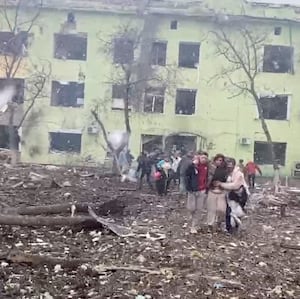JERUSALEM—Israel has been in a tricky position from the moment Russia’s war on Ukraine broke out.
Since the invasion two weeks ago, the country has been forced into a diplomatic high-wire act, supporting Ukraine with statements defending its sovereign integrity, an airlift of over 100 tons of humanitarian aid, and a soon-to-open field hospital, while avoiding an open clash with Russia, the de facto military ruler of Syria, which tacitly permits Israel to strike Iran-backed targets there.
Yevgen Korniychuk, Ukraine’s ambassador to Israel, donned an Israeli army helmet at a recent press conference at which he praised Israeli Prime Minister Naftali Bennett—who has become an unlikely mediator between Ukrainian President Volodymyr Zelensky and Russian President Vladimir Putin—but complained about Israel’s refusal to send his country non-lethal military aid, including helmets, bullet-proof vests, and the vaunted Iron Dome anti-missile batteries.
The game-changing Iron Dome system, developed jointly by the United States and Israel, has become so famous that Kyiv passersby, when approached by Israeli television crews, plead for “your iron sky” or for Israel to “make an Iron Dome over Ukraine.”
On Tuesday, Korniychuk broke down in tears in front of a silent, buttoned-down audience at Tel Aviv’s Institute for National Security Studies (INSS) when describing the bloodshed in Kharkiv, Ukraine’s second-largest city, and pleading for more assistance from his host country,
“They are bombing Kharkiv—Kharkiv!… like they bomb Aleppo,” he cried, referring to the legendary Syrian city flattened by Russian bombs. “The reality is that we are in a barbaric war and genocide of the Ukrainian people. Even when the humanitarian corridors opened, many civilians were killed. There is a shortage of food and pharmaceutical products,” he said. “We are seeking international assistance in all possible spheres, including from Israel—this country that we all believed is our close friend and partner.”
Israel took note of the disappointment-filled “believed,” and late on Tuesday let Kyiv know that it would not continue to take “harsh criticism” while exerting itself on Ukraine’s behalf, according to various local media reports.
Since Bennett’s secret trip to Moscow on Saturday, where he held hours of talks with Putin, Israel has assumed an unexpected prominence for a small country almost 2,000 miles from the fields of combat. Bennett has said little regarding his function in the discussions, allowing Zelensky and Putin to announce any contacts, keeping his few comments on foreign affairs to the parallel talks underway in Vienna, where a renewed nuclear deal with Iran, which Israel opposes, is reportedly close at hand.
Intimations of pressure on Israel to provide Ukraine military support, including from the Israeli public, which largely identifies with Ukraine, are met with explanations about Israel’s unique situation vis-à-vis Russia, and the blank wall of realpolitik.
“Israel is stuck between its interest in ongoing military coordination with Russia, and, on the other side, Israel is small nation allied with the West, particularly with the United States, to whom we owe a lot,” Professor Gideon Rahat, a Hebrew University expert on Israeli politics and public opinion, told The Daily Beast.
“Israeli leaders have to maneuver between those two. Of course, public opinion is untethered from these interests. With ex-Ukrainians pretty dominant in the public sphere, worried for their families, and when you see how the dictator Putin is about to take over another country, most of Israel see themselves as part of what we used to call, in Cold War days, the free world.”
Bennett was accompanied to Moscow by Ze’ev Elkin, his Ukrainian-born minister of housing and infrastructure, whose brother fled their native city of Kharkiv, under Russian bombardment, at the same moment the Israeli and Russian leaders sat in Moscow discussing the war, with Elkin translating.
Israel has also demurred from imposing sanctions on Russian oligarchs, some of whom are dual citizens. After praising Israel's willingness to help mediation efforts, a U.S. diplomat in Jerusalem said on Wednesday that "we would like to see our allies and partners imposing strong sanctions, Israel falls into the category of our allies and partners."
“We didn’t invite Putin into this region,” said Yaakov Amidror, a retired Israeli army major general who served as former prime minister Benjamin Netanyahu's national security adviser, alluding to the collapse of then-President Barack Obama’s “red line” regarding the use of chemical weapons in Syria, just across Israel’s border. Israel, Amidror said, in an interview, is as vulnerable as Ukraine is, to no less tenacious an enemy than Putin— Iran, whose leaders regularly promise to eliminate Israel.
As bad as the carnage is in Ukraine, he said, “it bothers me even more that the world allows a murderous regime like Iran’s to advance, and the implicit danger for Israel. I’m very sorry for Ukraine’s plight,” he said, “but imagine that we cannot act in Syria… It won’t take long for Iranian forces with Hezbollah-like dimensions to settle in Syria. Who will help us? Who will act for us?”
“We stand before a hypocritical world,” Amidror added, in which for Israel, the danger posed by Iran is not smaller than the danger of Putin to Europe. “Israel has to be careful because it needs the same freedom of action... We are a tiny country. And they want us to kill ourselves for Ukraine when the West is unwilling to take any sort of similar action for us.”
A U.S. diplomat familiar with the negotiations underway in Vienna, who was not authorized to speak with attribution, said he “would not dismiss” Amidror’s “legitimate concerns,” but believed the deal underway would protect Israel more than no-deal.
But the concern with Russia’s possible retribution against Israel is not comprehensive. Maj. Gen (res) Amos Yadlin, who headed Israeli military intelligence, and directed the INSS until late 2021, said there is, in fact, no real dilemma.
Russia’s presence in Syria “is a point we have to pay attention to,” he said, but “our interests lie clearly on one side: the side of democracy, freedom of press, human rights. Everything is being destroyed. In this case, our interests and our values unite.”
Solid relations with the United States, he said, “anchor Israel’s national security interests.”
“The Russians have never helped us,” he added, in an interview. “What has Russia ever done for us except for providing our enemies with weapons?”








